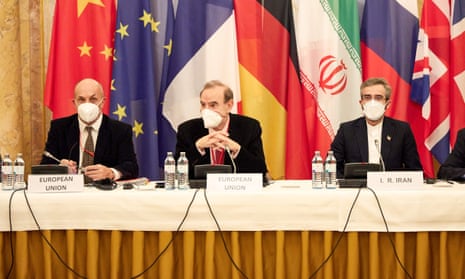Efforts to revive the Iran nuclear deal have been hauled back from the brink of collapse as Tehran revised its stance after pressure from Russia and China and clear warnings that the EU and the US were preparing to walk away.
The cautiously optimistic assessment came at the start of the seventh round of talks on the future of the nuclear deal in Vienna. It follows what was seen as a disastrous set of talks last week in which the US and the EU claimed Iran had walked back on compromises reached in previous rounds.
The Russian ambassador to the talks, Mikhail Ulyanov, said: “We managed to eliminate a number of misunderstandings that created some tension. Everyone confirmed their commitment to productive work [to restore the nuclear agreement].”
Nevertheless, Joe Biden warned that the United States was preparing “additional measures” against Iran, amid lingering fears that the talks could still fail.
“The president has asked his team to be prepared in the event that diplomacy fails and we must turn to other options,” said White House press secretary Jen Psaki.
The UK foreign secretary, Liz Truss, had warned that the talks represented the last chance for Iran to come back into compliance. Israel has been preparing military strikes in the expectation that the talks will fail, which would leave the Iranian nuclear programme unconstrained by any major multilateral agreement.
European diplomats admitted on the eve of the talks that some factions in Iran wanted to pull out of the nuclear deal. But Russia claimed Iran turned up on Thursday with a revised approach and a willingness to negotiate on texts agreed during the first round of talks that ended in June, rather than a wholly new set of proposals on sanctions and compliance with the 2015 deal tabled by Iran last week.
The Iranian chief negotiator, Ali Bagheri, also sounded more upbeat, saying: “What I felt today was different from what I had felt last Friday. I felt other parties have a more serious will to enter effective and result-oriented talks … What Iran proposed last week reflected its views on 20 June draft. We’ll continue talking.”
The EU diplomats had been privately placing faith in Russia, and to a lesser extent China, privately persuading Iran that its new demands on a wider US lifting of economic sanctions relief were unrealistic.
The battle over texts does not mean the remaining huge points of disagreement will be readily resolved, but last week the US was questioning whether the Iranian regime elected in June was interested in a deal or stalling as its domestic nuclear programme rapidly advanced.
